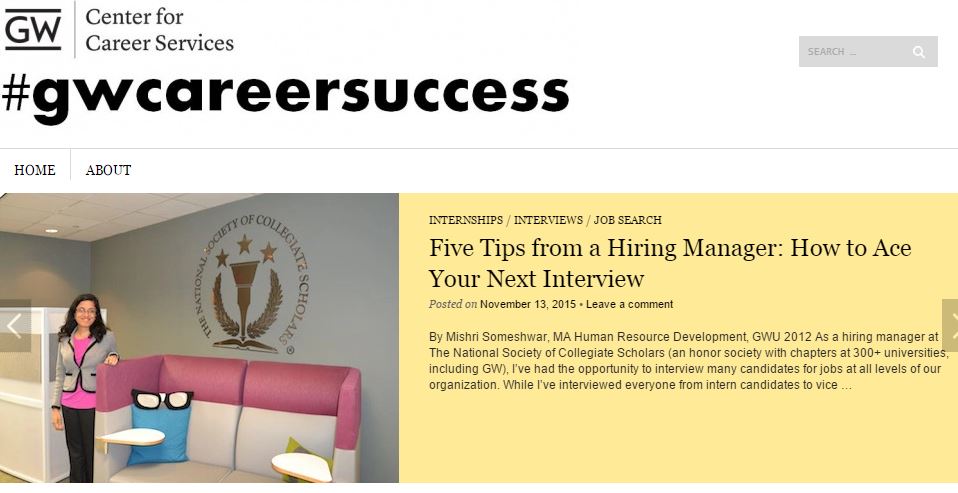Our very own Mishri Someshawar was interviewed this week for The George Washington University Center for Career Services. Mishri is a constant source of knowledge for our team internally…we’re proud to share some of her wisdom with you, scholars! Read her blog post below (originally posted here)
By Mishri Someshwar, MA Human Resource Development, GWU 2012
As a hiring manager at The National Society of Collegiate Scholars (an honor society with chapters at 300+ universities, including GW), I’ve had the opportunity to interview many candidates for jobs at all levels of our organization. While I’ve interviewed everyone from intern candidates to vice presidents, what surprises me in many of these interviews is that even candidates with tremendous experience make interviewing errors.
Here are some tips I have to offer, from watching successful candidates interview (including many GW candidates!):
- Be crisp: One candidate gave me a 10-minute soliloquy about why she was applying for the job. By the end I couldn’t articulate why she was here, or why she could be a good fit. Nor could she. When asked open-ended questions, have a brief (but vivid answer) that you can wrap up in 90 seconds.
- Don’t criticize prior employers/colleagues: Even if your aim is to prove that you “get it” and are good at dealing with people with outdated ideas, telling us how much better you were than your former colleagues is off-putting. Skip the critique; focus on the value you brought and the gratitude that your previous employer presumably had for your valuable contributions.
- Know your resume: Most people write great resumes (or have great resumes written for them) and then do a terrible job articulating what’s on it. If you’re asked a question pertaining to an item on your resume, answer the question directly. Too often, I see resumes with promising statements on them (e.g. increased revenue by 10%) without enough explanation of the how/why/what, when asked in the interview.
- Be specific: It’s one thing to say you’re a results-oriented game-changer on your LinkedIn profile. But in an interview we’re looking for specifics. Explain how you achieved what you did, what strategies you developed, projects you implemented and outcomes of that work. Be mindful not to use jargon specific to prior jobs– this includes departmental abbreviations, project titles, etc. If you must use them, preface with an explanation of what they are.
- Avoid the tangent: Too many interviewees get sidetracked by their own stories or ideas they want to expand upon in their response. Practice stopping yourself from going down tangent alley. Focus on the question. Answer the question. Don’t get sidetracked by your own stories.
- Bonus Sixth Tip– Only ask 3-4 questions: As a candidate for a job, it’s important to show that you’ve researched the role and have thoughtful questions. While a lot of candidates have asked me great questions, most struggle to limit themselves to a few. I had one candidate ask questions for 20 minutes. At that point it just got off-putting and worked against her. Stick with three, make them count, and don’t bother sifting through your list of 30 questions in front of me. Circle your top 3 before you walk into the room.
If you follow these crucial tips you are sure to have a successful interview!


